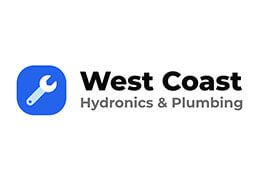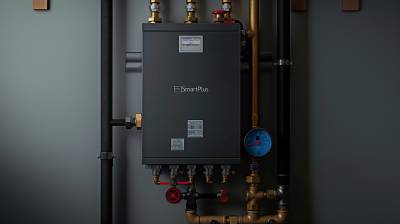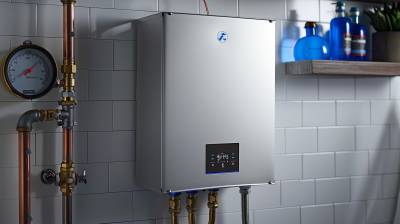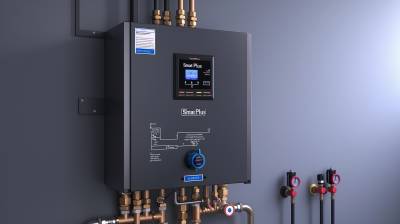Tankless water heaters have become increasingly popular over the years. This rise in popularity is primarily due to their efficiency, longevity, and compact size. When it comes to choosing between condensing and non-condensing tankless water heaters, making an informed decision can be a daunting task. However, understanding the operational principles as well as the advantages and disadvantages of each type can equip you with the knowledge to make the right choice for your needs.
Understanding Condensing Tankless Water Heaters
Condensing tankless water heaters are an advanced version of traditional tankless heaters, designed to improve energy efficiency. They work by using the heat from the exhaust gases to further heat the incoming water, thereby reducing energy consumption and making the whole process more efficient.
The Functioning of a Condensing Tankless Water Heater
The primary method in which a condensing unit operates is by exploiting the two heat exchangers. Here are the basic steps:
-
The unit draws cold water and passes it through the first heat exchanger. This process is powered by the combustion of natural gas or propane to heat the water.
-
The hot exhaust gases produced in the first step are then redirected to the second condensing heat exchanger instead of being vented outside.
-
This secondary heat exchanger condenses the exhaust gases, releasing extra heat that is used to preheat the incoming water before entering the primary heat exchanger.
-
Finally, the now-cooled exhaust gases are vented outside.
Energy Efficiency of Condensing Units
By using the heat from the exhaust gases that would otherwise be wasted, condensing tankless water heaters can reach energy efficiency levels of up to 98%. This excellent efficiency rating explains the increasing popularity of these heaters despite being relatively expensive.
Understanding Non-Condensing Tankless Water Heaters
A non-condensing tankless water heater, which is the more traditional style, uses a single heat exchanger to heat water as it passes through. This system does not recycle heat but instead, vents out exhaust gases directly.
The Functioning of a Non-Condensing Tankless Water Heater
Non-condensing units have a straightforward heating process, with the key steps being:
-
The units ignite the natural gas or propane fuel when it detects water flow.
-
This combustion heats a single heat exchanger.
-
The cold water passing through this heat exchanger gets heated up before being transported for use.
-
The remaining exhaust gases are vented outside directly.
Energy Efficiency of Non-Condensing Units
Non-condensing units have an efficiency rating of around 80-85%, which, although lower than their condensing counterparts, is still significantly higher than traditional tank-type water heaters. Their lower upfront costs make them a popular choice among homeowners.
Installing Condensing and Non-Condensing Water Heaters
The installation process has a significant influence on the choice between condensing vs non-condensing tankless water heaters.
Installing Condensing Units
Condensing water heaters demand PVC, CPVC, or ABS drainpipes for venting, which are less expensive and easier to install as they can withstand cooler exhaust gas temperatures. Their installation sites require a suitable drain for the condensate from the combustion process.
Installing Non-Condensing Units
Since non-condensing tankless water heaters vent hot exhaust gases, they require category III stainless steel venting, which is more expensive. This is due to the fact that the venting needs to handle high temperatures that can reach up to 300 degrees Fahrenheit. The installation process, therefore, can add significantly to the total expense.
Lifespan of Condensing and Non-Condensing Units
While both types of heaters boast a longer lifespan than traditional tank water heaters, there are differences between them.
Lifespan of Condensing Units
Since condensing units must deal with the corrosive effects of the condensate, their lifespan tends to be slightly less than their non-condensing counterparts. But by maintaining them properly and flushing out corrosive condensate appropriately, their life can be extended to match that of non-condensing units.
Lifespan of Non-Condensing Units
Non-condensing units, being simpler in design and having less corrosive materials to cope with, typically have a longer lifespan. However, this is heavily dependent on proper care and maintenance.
Despite the subtle differences between condensing and non-condensing tankless water heaters, what matters is choosing one that suits your specific requirements, whether it's energy efficiency, cost, or ease of installation.
FAQs on Condensing vs Non-condensing Tankless Water Heaters
What is the main difference between condensing and non-condensing tankless water heaters?
The main difference between condensing and non-condensing tankless water heaters lies in their energy efficiency and the way they handle exhaust gases. Condensing units use heat from the exhaust gases to heat water, making them more energy efficient. Non-condensing units, on the other hand, vent these gases out without using the heat, making them less efficient.
How does a condensing tankless water heater work?
A condensing tankless water heater uses a secondary heat exchanger to utilize the heat from exhaust gases to further heat the water. This means the system is more energy efficient. The condensate or steam produced from this process is then drained out.
How does a non-condensing tankless water heater work?
In a non-condensing tankless water heater, gas or electricity heats the water as it passes through the heat exchanger. The exhaust gases are vented out directly without being used to heat the water, which leads to less energy efficiency.
Are condensing water heaters more energy efficient?
Yes, condensing water heaters are usually more energy efficient than non-condensing units. They can reach efficiencies up to 98%, while non-condensing units typically reach efficiencies of 80-85%.
What gases do non-condensing tankless water heaters emit?
Non-condensing tankless water heaters emit exhaust gases, including carbon monoxide and nitrogen oxide, the higher temperature flue gases which need special venting materials to handle the heat.
Do condensing water heaters require special venting?
No, condensing water heaters typically do not require special venting due to their low temperature exhaust gases. This can result in lower installation costs compared to non-condensing units.
What is the price difference between condensing and non-condensing tankless water heaters?
While the price range can largely depend on the brand and model, condensing tankless water heaters are generally more expensive to purchase than non-condensing units. However, they can be more cost-effective in the long run due to their energy efficiency.
How do the energy costs compare for condensing vs non-condensing water heaters?
Given their higher efficiency, condensing water heaters can potentially lead to lower energy costs in the long term. On the other hand, non-condensing water heaters, while cheaper upfront, may contribute to higher energy costs due to their lower efficiency.
Is maintenance different for condensing and non-condensing tankless water heaters?
The maintenance for both types of heaters is very similar. However, condensing units might require extra care to ensure the condensate is draining properly. But, the lower exhaust temperatures in condensing units can lead to less wear and tear over time.
Are condensing water heaters more environmentally friendly?
Given their high energy efficiency and the ability to reduce the emission of harmful gases by using them to heat water, condensing water heaters can be considered more environmentally friendly compared to non-condensing models.
What should I consider when choosing between a condensing and non-condensing tankless water heater?
Factors you should consider include your budget, energy costs, venting requirements, maintenance considerations, and environmental impact. You should also consider the efficiency, lifespan, and potential savings each option offers over time.
Pros and Cons of Condensing Vs Non-Condensing Tankless Water Heaters
Condensing Tankless Water Heaters
Pros of Condensing Tankless Water Heaters
-
Higher Energy Efficiency: Condensing tankless water heaters are able to achieve higher efficiency rates because they make use of the heat from the exhaust gas, which is typically wasted in non-condensing units. This can result in efficiency rates as high as 90-98%.
-
Lower Operating Costs: Due to their high efficiency, condensing units can lead to significant energy savings over time, leading to lower operating costs.
-
Environmentally Friendly: Condensing tankless water heaters reduce the amount of heat wasted and thus reduce greenhouse gas emissions, making them more environmentally friendly compared to non-condensing units.
-
Longer Lifecycle: By design, condensing tankless heaters have a longer lifecycle than their non-condensing counterparts. This makes them a potentially more cost-effective choice in the long run for homeowners who plan to stay in their houses for a long period.
Cons of Condensing Tankless Water Heaters
-
Higher Initial Costs: Condensing tankless water heaters tend to have higher upfront costs compared to non-condensing units due to their more intricate design and need for a sophisticated venting system.
-
Complex Installation: These units typically require professional installation due to their need for special venting materials and system. This can add to the initial cost.
-
Maintenance Requirements: Condensing models require consistent annual maintenance to ensure they run efficiently. The condensate produced by these units can be slightly acidic and needs to be neutralized which adds to maintenance requirements.
Non-Condensing Tankless Water Heaters
Pros of Non-Condensing Tankless Water Heaters
-
Lower Initial Costs: Non-condensing tankless water heaters are generally less expensive than condensing models. Thus, they are a more affordable choice for homeowners working on a tight budget.
-
Simpler Installation: These units do not require a complex venting system which makes the installation easier and less expensive when compared to that of condensing units.
-
Lower Maintenance: Non-condensing options often come with less maintenance needs as compared to condensing systems. With the absence of condensates, you do not need to worry about corrosive elements damaging your system over time.
Cons of Non-Condensing Tankless Water Heaters
-
Lower Energy Efficiency: Non-condensing water heaters are not as energy efficient as their condensing counterparts. They don't utilize the heat from the exhaust gases, leading to an efficiency rate of about only 80-85%.
-
Higher Operating Cost: As a result of their lower efficiency, these types of water heaters will usually have a higher operating cost over time.
-
Shorter Lifespan: Non-condensing tankless water heaters typically have a shorter lifespan than condensing units, which might mean additional costs in the future for replacement units.
Summary
The choice between condensing vs non condensing tankless water heater fundamentally lies on factors like efficiency, cost, and installation requirements. Condensing ones, despite being pricier and more complex to install, offer greater energy efficiency which can drastically cut down on utility bills. On the other hand, non-condensing models come with a straightforward installation process and cheaper upfront costs, but end up consuming more energy.
Long term considerations play a huge role in the decision between condensing vs non condensing tankless water heater. If you're someone who's planning to stay in your home for a long period, investing in a condensing unit may be more cost-effective in the long run. But if you're unsure or planning to move soon, a non-condensing model would be a more logical choice due to its cheaper upfront costs.
Therefore, there's no definitive answer on which is better between condensing vs non condensing tankless water heater. It ultimately depends on the user's preference, their unique situation, and their long-term plans. Both have their advantages and limitations, but understanding these will help inform your decision and fulfill your specific requirements in the best way possible.
About West Coast Hydronics & Plumbing
Meet West Coast Hydronics & Plumbing, a Sacramento, CA-based company that's winning hearts with quality services and customer satisfaction in the field of hydronics and plumbing. We have years of experience and a team of skilled professionals ready to tackle any plumbing task that comes our way. Our commitment to maintain the highest standards in our services is what sets us apart. Want to know more about our top-notch plumbing services? Dive into the world of West Coast Hydronics & Plumbing by clicking here for an in-depth look at how we're changing the game in plumbing and hydronics.







